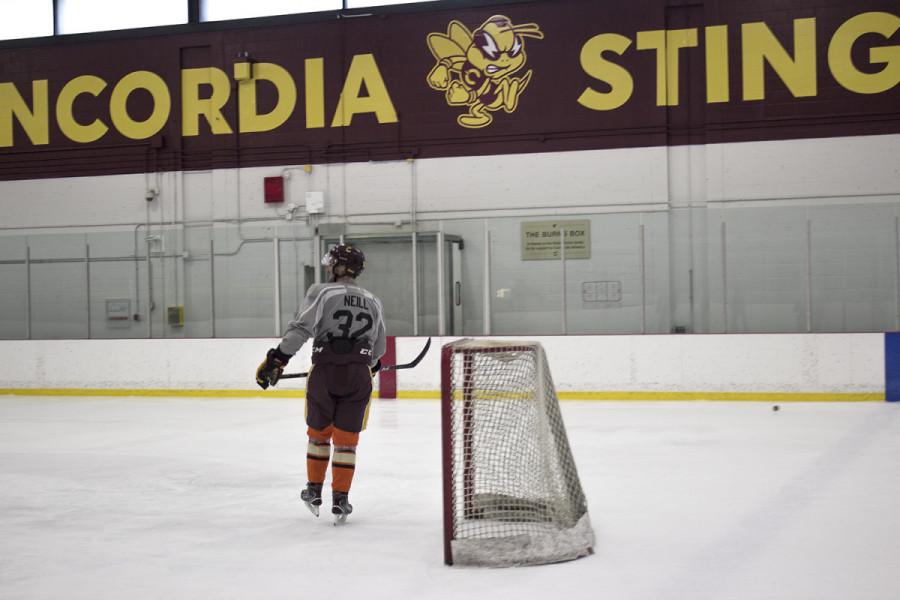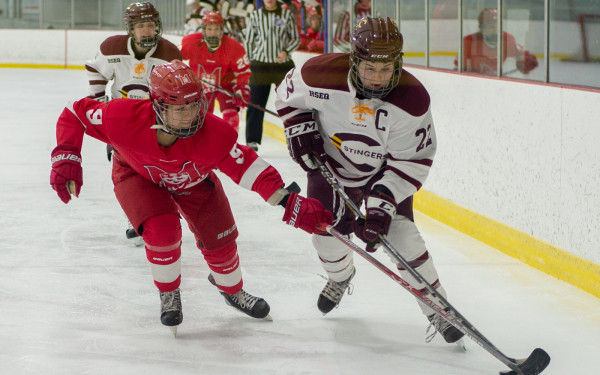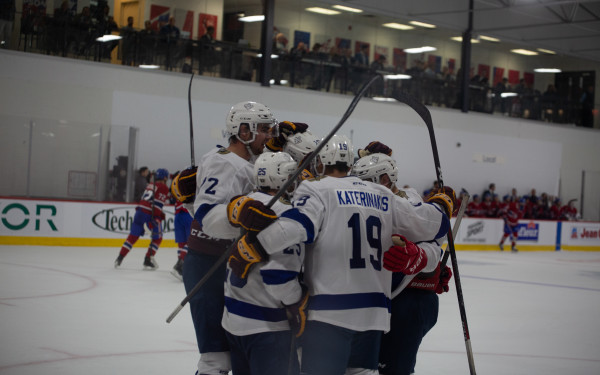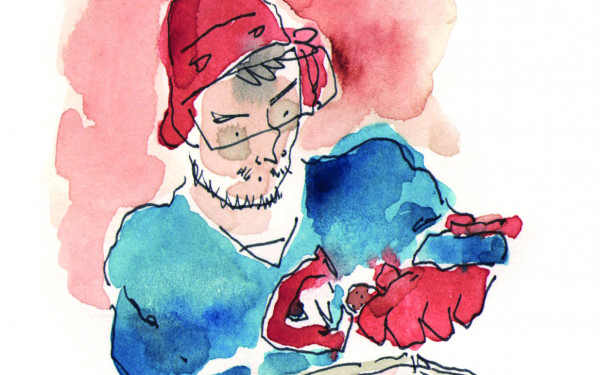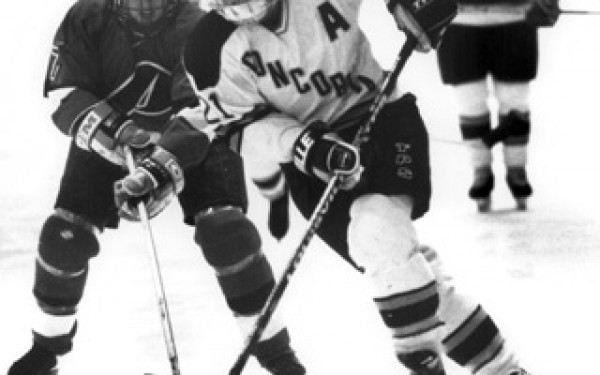U Sports Hockey Graduating More and More Pro Players
How Pro Deals Are Becoming More and More Realistic for U Sports Hockey Players
Carl Neill feels safe taking risks.
The risks he takes on the ice with the Concordia Stingers are part of what has made him one of the most dangerous and productive defencemen in university hockey.
His potential risks off the ice are why he’s alright with putting himself in danger’s way when he’s playing an aggressive, physical game that could result in injury.
Since graduating from the Quebec Major Junior Hockey League at the end of the 2016-2017 season, Neill—a former NHL draft pick by the Vancouver Canucks—has been committed to U Sports hockey.
He’s earned a collection of honours and awards in that time, proving himself to be among the country’s elite, and even earning professional contract offers.
Unlike many of the rising number of U Sports athletes around him getting these offers, Neill isn’t biting just yet.
“There were offers that were coming in after [this past] season ended, but like I said when I came here, I want to get a degree before I leave,” said Neill. “It would have taken an offer I couldn’t refuse for me to leave.”
That’s Neill betting on himself and his play. It may be a risk not to take what’s in front of him, but he believes it’s worth it.
He’s had contract offers every year since leaving junior, but never ones he felt safe with.
Many were short term contracts or in lower tier leagues. He knows that hockey isn’t forever—one injury could take him out of the game, and a one-year contract that doesn’t offer long term financial security is out of the question for him right now.
Instead, he’s taking the longer road to the professional leagues, earning his degree so that after what he hopes is a long professional career, he’s not left without options.
“I’d rather have a really good backup plan,” said Neill, whose parents instilled in him the importance of a degree from a very young age.
It’s not a rule without exceptions as Neill mentioned. It would be difficult to turn away from a deal like an NHL entry-level contract.
Those align players with an NHL team and pay between $47,500 USD (although most on these contracts earn about $70 000 USD) and $925,000 USD a year, and that’s before factoring in signing and performance bonuses.
All in all, highly skilled NHL players on those kind of contracts can earn over $3.7 million USD.
While the goal of a contract like that is a lofty one for Neill or any other players in U Sports, it’s becoming more and more of a possibility.
Just a few months ago, the NHL’s Calgary Flames inked centre Luke Philp to such a contract.
He had been a star player for the University of Alberta and worked his way to a deal that not only financially supports him but is going to have him playing in either the NHL or the American Hockey League, with the affiliate team of the Flames, the Stockton Heat.
He’ll have the best trainers and coaches possible and the chance to impress at the professional level and earn further contracts.
While Philp’s deal might be the top tier, it’s just another example of more and more U Sports players finding contracts.
The league is improving every year and so are its players. Stingers head coach Marc-André Élement has seen this development happening for years and knows just how high of a quality the league has reached.
A veteran of 120 U Sports games and former captain of the Stingers, Élement played for the team from 2006 to 2011—a very different time for U Sports.
“It’s so different from when I played. The game is getting faster and faster. Kids are stronger. The pace of the game is so intense,” said the Stingers coach. “I find the players that come play in U Sports show up every night. They know they only have 28 games. You can’t take a night off.”
The level of play is fun for fans, but it’s also getting results for players.
“Nowadays, every year there’s a lot of guys who go and play pro right away,” said Élement, describing players that, unlike Neill, choose to grab professional offers after just a year or two in U Sports.
In the past season alone, Concordia saw four of its players turn pro, three after graduating and one after just a year of play.
Other teams saw players earn American Hockey League deals (a step below the NHL), contracts with the Russian Kontinental Hockey League (one of the premiere leagues in the world), and ECHL deals.
This offseason, U Sports players signed European pro contracts across Sweden, Switzerland, France, England, Scotland, Norway, Hungary, Slovakia, Finland, and Belgium.
U Sports has proven to be a viable option for graduating players into pro leagues across the world.
It’s a chance for players who age out of major junior hockey without contracts to show their talent and keep developing as players with scouts and coaches watching. It’s a league that can help fresh talent, late bloomers, and players in need of a rebound alike.
According to Élement, professional teams trust players coming out of U Sports—they have noticed just how strong of a league it has developed into.
The coach also explained that young players are recognizing the benefits of U Sports, like scouting visibility, level of play, and gym time.
Neill, like his coach, has seen the prestige and level of play in the league rise. He noted that it’s in a bit of an ever growing loop.
“It goes hand in hand with the quality of players that are coming here. Guys are starting to realize there’s life after hockey and there’s more and more guys who could play pro that are deciding to go the U Sports route.”
— Carl Neill
“It goes hand in hand with the quality of players that are coming here,” said Neill. “Guys are starting to realize there’s life after hockey and there’s more and more guys who could play pro that are deciding to go the U Sports route.”
With more players joining, more impact players with high pedigree from major junior hockey end up in the league.
That helps the visibility of the league, and these players end up graduating to the pros.
The more visibility and graduates the league has, the more pro teams pay attention and send scouts to games.
The more players realize that this is the case, the more high end players take the U Sports path, and so on and so on
Mission accomplished
While plenty of players are earning contracts, there are two streams of U Sports players earning them.
You have the Carl Neills, finishing their time with the universities, spending four or five years with a team in most cases before turning pro.
On the other hand, you have players staying for one, maybe two years, showing what they can do and finding contracts.
Concordia has lost their top centres like this in back to back years.
Last year it was Hugo Roy, the goal scoring machine that earned a multi-year AHL deal. Before that, U Sports MVP Anthony Beauregard left the team for a tryout with the Laval Rocket of the AHL before signing in the ECHL and later heading to play in Europe.
For Beauregard, the plan was not to come in and play a season and a half before turning pro full time. He was an undrafted player that had played a few pro games in the ECHL.
He didn’t think that a real return to the pros was possible so quickly. He also didn’t really understand the level of the league before joining the Stingers.
“[How good U Sports is] was more like a surprise. You know when you quit pro hockey you think it’s going to be easy. But I can tell you it’s not,” said Beauregard with a laugh. “It’s just another league where you have some good teams and some good players.”
But when he was given top line minutes along with powerplay and penalty kill time, he put up 19 points in 12 games in his first season in 2016-2017 before scoring 60 in 28 and earning league MVP and pro interest the next.
How differently he and Roy viewed the league coming in shows just how much the reputation and league itself are growing year to year.
Roy joined the team in 2018—replacing Beauregard as the team’s top line centre—and had an extremely successful rookie campaign that earned him a contract with the Milwaukee Admirals.
His words just after: “Mission accomplished.”
“It was my goal coming to Concordia. I knew that I would have the opportunity to play a lot. It was my goal to get a pro contract,” said Roy.
He had chosen U Sports because he knew it meant a chance to be seen by pro scouts and develop quickly to get to the big leagues as fast as he could.
Beauregard never lost sight of his dream when joining Concordia but didn’t have quite the timetable planned out that Roy recognized was possible.
The two had similar paths towards the same goal, though. It’s the same goal that Neill has, the same goal that most U Sports players have.
Even if some take the long route with a backup plan and others jump in head first, they’re all shooting for the same thing.
The end game that they’re looking for is becoming more attainable as the league and it’s players get better and better.
“U Sports is a really good league. Better than everybody thinks,” said Beauregard. “I will never regret my move to come to Concordia.”

